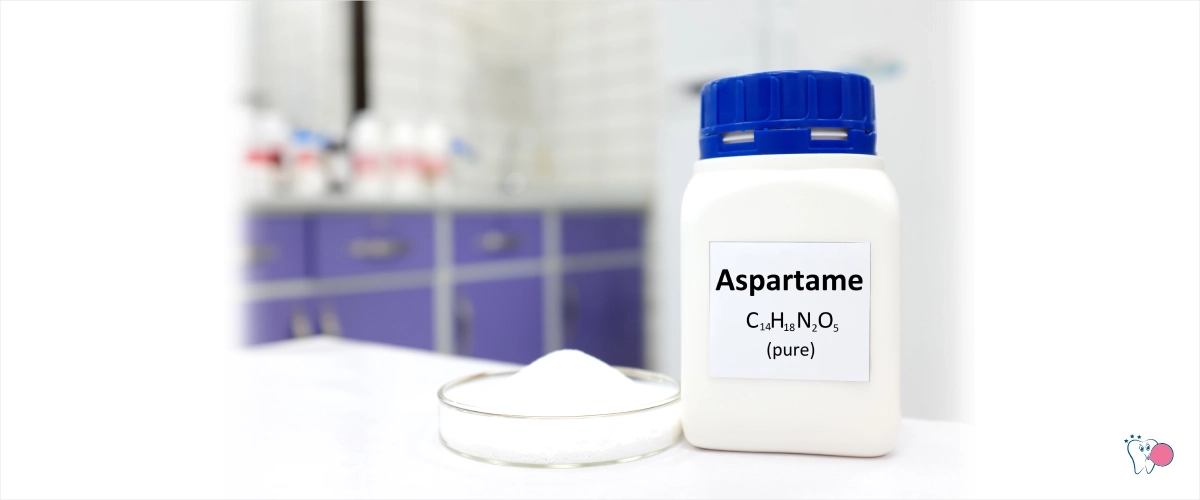The World Health Organization (WHO) recently stated (July 14, 2023) that, citing “limited evidence” of carcinogenicity in humans, the IARC has classified aspartame as a Group 2B carcinogen, meaning it is “possibly carcinogenic to humans.” . Aspartame was thus classified for the first time in “Group 2B,” which designates aspartame as a substance that is possibly carcinogenic to humans (possibly carcinogenic to humans). JECFA reconfirmed the acceptable daily intake of aspartame at 40 mg/kg of body weight. It is, of course, up to each of us to draw our own conclusions from this. Just for your information, commonly available chewing gum in supermarkets and stores contains 99% of the artificial sweetener aspartame, which has long been considered a harmful substance. People are unaware of this. That is why we are writing about it, so that you can learn about it and form your own opinion.
Aspartame is carcinogenic
Aspartame (E951) is one of the best-known artificial sweeteners. It is classified as a food additive and is widely used by food manufacturers. However, this does not mean that it is good to consume. To put it simply, aspartame is “on the edge” and belongs to the group of controversial ingredients in chewing gum/food. And the fact that there is little evidence that aspartame causes cancer does not reassure me. There has been speculation for years that it is carcinogenic. This artificial sweetener is classified as highly harmful and unsuitable for children. It is very common for aspartame to be found in chewing gum, powdered drinks, tea, yogurt, desserts, puddings, breakfast cereals, mayonnaise, pickled vegetables and fruit, and other foods.
2023 survey results – is aspartame carcinogenic or not?
According to Dr. Francesco Branda, Director of the WHO’s Department of Nutrition and Food Safety [2], describe the potential effects of aspartame, which need to be investigated further and with better studies.
These two bodies, IARC [3] and JECFA [4] conducted independent but complementary reviews to assess the potential carcinogenic hazards and other health risks associated with the consumption of aspartame. This was the first time that IARC had evaluated aspartame and the third time for JECFA. IARC classified aspartame as possibly carcinogenic to humans (Group 2B) [5] based on limited evidence of cancer in humans (specifically hepatocellular carcinoma, a type of liver cancer). There is also limited evidence of cancer in experimental animals.
The implications of the new classification of aspartame may be far-reaching
About aspartame [6], we can say that the World Health Organization has classified it as a potentially carcinogenic substance. This could have far-reaching implications for the food industry. The artificial sweetener aspartame is used to sweeten chewing gum and carbonated soft drinks, including Diet Coke. This artificial sweetener is 200 times sweeter than refined sugar (common sugar). It is widely used in the food industry, but also in the manufacture of medicines. Sweetener manufacturers criticize the IARC’s work, saying that its statements could be misleading, as has been the case several times in the past.
What to think about the CTK article “ICBA: Aspartame is safe, confirm WHO and FAO” | Caution – common sense must be used
It is very difficult to trust the statements [7] issued by the ICBA (International Council of Beverages Associations). This organization is an international non-governmental organization founded in 1995 that represents the interests of the global soft drink industry. Its members include national and regional beverage associations and international beverage manufacturers operating in more than 200 countries and regions, producing, distributing, and selling various carbonated and non-carbonated soft drinks, including lemonades, sports drinks, energy drinks, bottled waters, flavored and/or enriched waters, ready-to-drink teas and coffees, 100% fruit or vegetable juices, nectars and juices, and milk-based beverages.
Having just read the entire list of what the ICBA stands for, I hope it is clear that this organization is not going to say that aspartame is a problem. The ICBA is there for beverage companies, for their growing revenues. That is why it was created. Its goal is to promote its interests. This article, published by CTK, provides information on what the ICBA has taken from the statements of the WHO, FAO, JECFA, and IARC. It is a slightly distorted view of the matter. Note the passage where CTK quotes the ICBA’s executive director—i.e., that this is not the opinion of the WHO, FAO, JECFA, or IARC, but the opinion of the ICBA. I will now quote from the CTK article, which clearly shows what the article contains – “ICBA Executive Director Kate Loatman welcomed the WHO and FAO conclusions with the words:” Or this sentence: “In connection with the opinion of the International Agency for Research on Cancer (IARC), which was first published on June 29, Ms. Loatman added:”. We must learn to read between the lines. Today’s world is full of lies and distortions of facts. Marketing and lobbying practices are more visible. You have to take this into account and view information accordingly. CTK only reports what has been said, it does not distort, but we must also think critically about what we read in Czech newspapers.
What to take away from this | Recommendations
It’s up to each of us. There are many people among us who know that smoking is unhealthy and yet still smoke. Many of us also know that large amounts of alcohol are harmful to our health, yet we continue to drink heavily. There is also a group of people, to which we belong, who care about our health and the health of our loved ones. If we know that a substance is harmful to our health, we avoid it or at least try to limit its consumption to a minimum. It is not necessary to avoid everything that could potentially harm our health 100%. And that is where our recommendation comes in.
If you chew a lot and want to take full advantage of the benefits of chewing, look for a healthier option chewing gum without aspartame and plastic materials – i.e., chewing gum that states that gum base does not contain plastic materials or that it is gum with a natural gum base.
If you chew gum once a month, you probably don’t need to worry about it at all. It’s up to you.
Sources
- 1) WHO post from July 14, 2023 – results of the assessment of the hazards and risks of aspartame published (WHO – Aspartame hazard and risk assessment results released) – https://www.who.int/news/item/14-07-2023-aspartame-hazard-and-risk-assessment-results-released
- 2) World Health Organization (WHO) – https://www.who.int/
- 3) International Agency for Research on Cancer (IARC) – https://www.iarc.who.int/
- 4) Joint FAO/WHO Expert Committee on Food Additives (JECFA) – https://www.fao.org/food-safety/scientific-advice/jecfa/en/
- 5) IARC graphical representation of hazard classification (IARC Monographs Hazard Classification) from IARC (WHO) – https://www.iarc.who.int/wp-content/uploads/2023/06/IARC_MONO_classification_2023_updated.png
- 6) Aspartame (E951) – characteristics, use, production, and adverse effects on ferpotravina (in the Czech language) – https://www.ferpotravina.cz/seznam-ecek/E951
They wrote about aspartame on the current topic “aspartame is carcinogenic”
- 7) Article in CTK (Czech News Agency – in the Czech language) dated July 14, 2023 – ICBA: Aspartame is safe, confirm WHO and FAO – https://www.ceskenoviny.cz/pr/zpravy/ icba-aspartame-is-safe-confirmed-by-who-and-fao/2390025
- 8) Article from July 14, 2023 – Doctor (in the Czech language): We thought sweeteners were better than sugar – https://www.novinky.cz/clanek/domaci-lekarka-mysleli-jsme-ze-sladidla-jsou-lepsi-nez-cukr-40438179
- 9) Article from June 29, 2023 on aktualne.cz (in the Czech language) – WHO agency to label sweetener aspartame as potentially carcinogenic. It is used in the production of Coca-Cola and chewing gum – https://zpravy. aktualne.cz/zahranici/agentura-who-oznaci-sladidlo-aspartam-za-potencialne-rakovin

